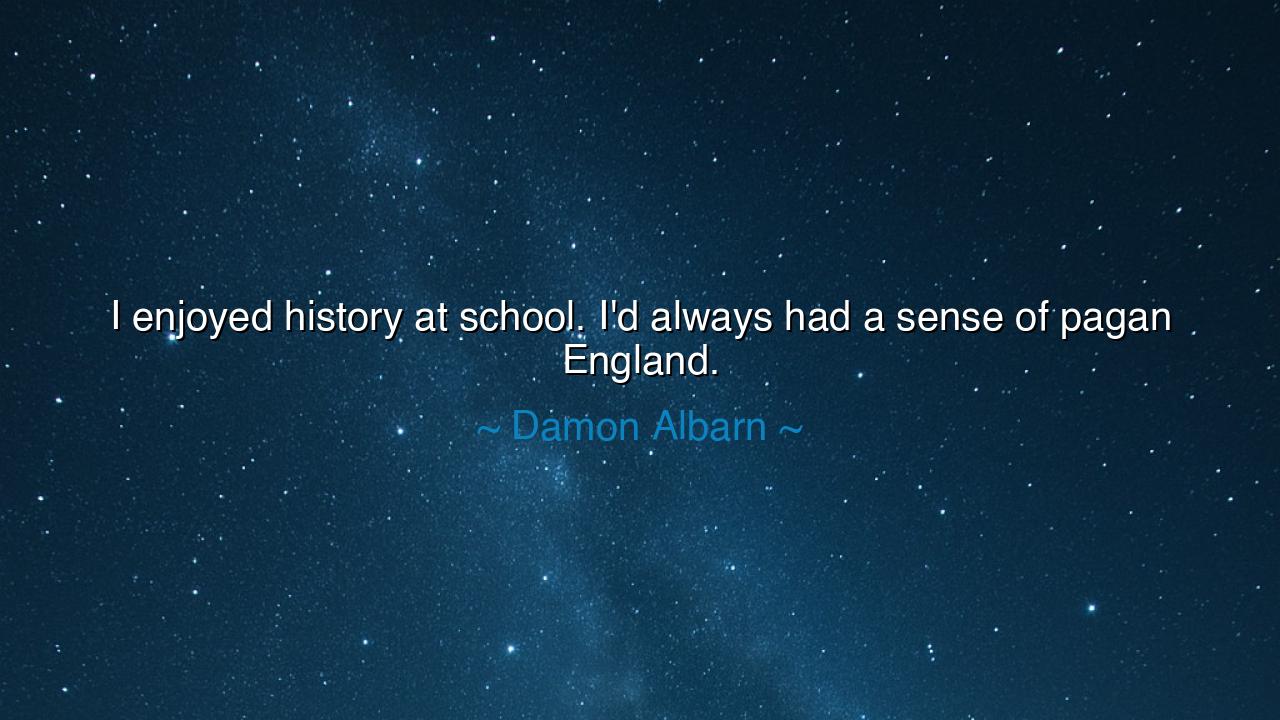
I enjoyed history at school. I'd always had a sense of pagan






“I enjoyed history at school. I'd always had a sense of pagan England.” Thus spoke Damon Albarn, the poet-musician whose voice has long bridged the ancient and the modern, the spiritual and the electric. Though his words seem gentle, even nostalgic, they are charged with something deeper—a longing for roots, for the forgotten pulse beneath the soil of civilization. When he speaks of history, he speaks not of dusty chronicles or faded kings, but of something living—something pagan, earthy, and primal. His reflection is not merely about memory, but about connection—the bond between the modern soul and the ancient spirit that still breathes in the land.
In this quote, Albarn reminds us that history is not dead—it is alive in us, moving through our blood and shaping our imagination. The “pagan England” he senses is not a religion, but a resonance—the whisper of an older world where man lived in harmony with earth and sky, where the seasons guided the spirit and nature was not conquered but revered. To have “a sense” of this is to feel that the past is not a shadow behind us, but a light beneath us—one that glows through the centuries, dimmed but never extinguished. Albarn, like the poets of old, listens for that light and seeks to carry it forward into his art.
There is a sacred melancholy in these words, for they arise from a modern age that has forgotten its own beginning. The pagan heart of England—the stones of Stonehenge, the chants of the druids, the myths of forest and flame—lies buried beneath the noise of progress. Yet, from time to time, the sensitive soul still hears it. The artist, especially, feels the ache of separation. He walks through cities of glass and steel but dreams of oak groves and moonlight. Albarn’s love of history, then, is not mere scholarship—it is a yearning to remember, to rediscover the innocence and wonder that once bound man to the living world.
Consider, for a moment, the story of William Blake, the visionary poet who, like Albarn, felt the pulse of ancient England within his veins. In the heart of industrial London, surrounded by smoke and greed, Blake saw angels in the trees and gods in the rivers. He cried out against the “dark Satanic mills” that smothered the divine spirit of the land. His poetry, fiery and strange, sought to awaken that forgotten sense of holiness within the ordinary. In him, as in Albarn, we find the same instinct: the desire to bring the mythic past into conversation with the present—to remind mankind that the spiritual and the earthly were once one.
The origin of this quote lies in Albarn’s lifelong relationship with history, folklore, and music. Whether through the haunting sounds of Gorillaz or the pastoral echoes of Blur, he has always sought to weave together modern rhythm and ancient memory. His fascination with England’s past—the rituals, songs, and superstitions of the early tribes—represents not escapism, but understanding. For to know history deeply is to know oneself more completely. To feel “a sense of pagan England” is to recognize that beneath our rationality, our technology, and our pride, we are still creatures of the earth, drawn to firelight, rhythm, and story.
And what, then, is the lesson in his words? It is that every generation must reconnect with its roots, lest it forget who it is. Progress without memory is like a tree without soil—it may stand for a time, but it cannot grow. To love history is to be humble before time; to sense the pagan is to remember that wisdom does not always wear the robe of reason. There is truth in instinct, in ritual, in reverence for nature. Modern life often teaches us to dominate the world, but the ancients knew how to belong to it. Albarn’s insight, quiet yet profound, is a call to balance—to blend the mind of the modern with the soul of the ancient.
So let us, as he did, listen for the echoes of the old gods in the wind. Let us walk through forests with awareness, and through our histories with wonder. Let us study the past not as a collection of facts, but as a living inheritance, a mirror that reflects both our greatness and our fragility. The sense of pagan England—or of any ancient culture—is not superstition, but remembrance: a reminder that before empires, before machines, before all the noise of progress, humanity knew how to live with awe.
Thus, Albarn’s words stand as a quiet teaching for the soul of our time: do not lose the memory of your beginnings. For the music of history still plays beneath the world’s modern song, and if you listen closely—past the hum of cities, past the chatter of progress—you may yet hear it: the heartbeat of your ancestors, steady and eternal, calling you home to the roots of being.






AAdministratorAdministrator
Welcome, honored guests. Please leave a comment, we will respond soon